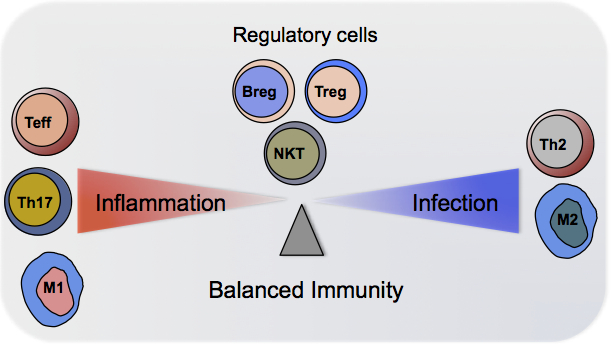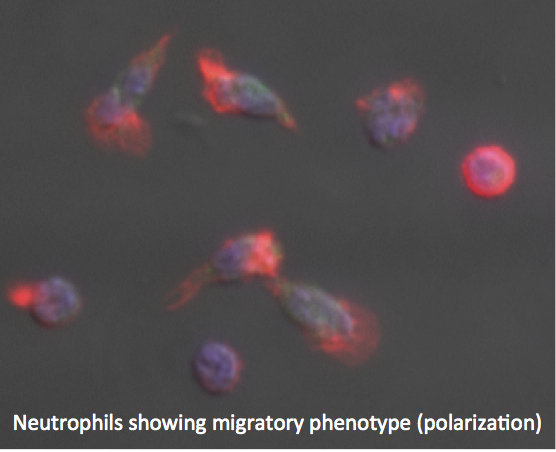Immuno-pharmacology
Growing evidence linking the majority of diseases to dysfunctions of the innate and adaptive immunity led to immense interest in the crosstalk of pharmacology and immunology field. Accordingly, immuno-pharmacology addresses the selective up- or down- regulation of immune responses and exploit beneficial therapeutic opportunities for immune system-driven unmet clinical needs for an expanding range of pathologies, including cancer and inflammatory, infectious, immune and metabolic diseases. Remarkably, in recent decades drugs modulating immune cell functions including non-steroidal anti-inflammatory drugs, anti-cancer, anti-histamines, corticosteroids and immunosuppressant agents have been extensively exploited in the treatment of inflammatory, allergic and autoimmune disorders. For examples, innate immune cells like neutrophils and monocytes attack intruders and then signal to acquired T cell based immunity responses, while NK cells mediate immunity against developing tumors and virus-infected cells and decline in NK cells with age progression instigate various cancers and infections. Together these immune responses are under tight regulation directed by regulatory cells. Thus immuno-modulators foresee tremendous therapeutic potential.

Immuno-pharmacological studies are essential in drug discovery program to better understand immune response modulation for a more effective and safer therapeutic options for various unmet diseases. Here we are utilizing immuno-modulatory approach for drug development from novel small molecules, natural products or herb extract and also aim to reveal immuno-modulatory effects of those currently in use for improving the effectiveness and safety. This further allows to better predicting any hematological complications due to drug treatment in long term. Various herbs and plant extracts possess immuno-stimulatory, antimicrobial, anti-inflammatory, and pro-regenerative properties might be beneficial as biological enhancers to boost immune system against various patho-physiological conditions.
Neutrophil and leukocytes in metabolic syndromes
Metabolic disorders like diabetes, atherosclerosis and obesity are associated with insulin resistance, hyperlipidemia and chronic inflammation. Alteration/dysfunction of immune responses lead to inflammation or immunodeficiency. In recent years, metabolic syndromes have been linked with infiltration of immune cells like neutrophils, macrophages, T and B cells that show significant functional plasticity in diverse patho-physiological condition through subtypes, for example, T helper and cytotoxic T cells, but molecular mechanisms of altered immune responses are not well defined. Our research is focused 1) toidentify altered key immune cells like macrophages, neutrophils, NK, B and T lymphocytes and subsets in metabolic disorders using distinct animal models. 2) To investigate effect of distinct metabolic pathways on immune cell function and dissect mechanism of immuno-activation/ suppression.3) To specifically target recruitment and functional activation of altered immune cell population in metabolic syndrome.

Neutrophils are most abundant leukocytes that provide front line defenses. These cells recruit to site of infection/inflammation though regulated series of events and produce ROS and release proteases. Neutropenia can leads to immunodeficiency, while aberrant activation causes deleterious tissue injury/damage. Importantly neutrophil count increases during insulin resistant and diabetic conditions, but neutrophil function like phagocytosis, ROS and chemotaxis dampen significantly.Importantly most of research in last decades has been focused on effect of diabetes i.e. hyperglycemia on neutrophil number and functions, in contrast to causative role of neutrophils in diabetes. Studies have also found an early infiltration of neutrophils to adipose tissue during the development of diet-induced obesity. Our group is focused to reveal precise role of neutrophil in diabetes and other metabolic syndrome development. Classical view of neutrophils as homogenous population has also been challenged recently with identification of neutrophil heterogeneity. Thus we are furtherunraveling the role of specific subpopulations of immune cells including abundant neutrophils, critical in metabolic syndromes.
Hematopoietic stem cell and bone marrow niche biology
Hematopoietic stem cells (HSCs) provide sustained blood formation though their long-term ability to regenerate themselves, so-called “self-renew”, and at the same time to give rise to all mature blood lymphoid and myeloid lineages, i.e. differential abilities. HSCs are rare cells, responsible to replenish all blood lineages and rapid recovery after injury or infection. It is well established now that HSCs with steady self-renewal capacity remains in the quiescent (dormant) state and after any injury/stress these cells proliferate quickly to re-establish homeostasis,while uncontrolled proliferation causes functional exhaustion of HSCs and BM failures. Maintenance of HSC pool is regulated by complex network of regulators in unique microenvironments, known as the stem cell niches in the bone marrow.

HSC fate decision to self-renew and differentiation is highly regulated process through both cell-intrinsic and extrinsic mechanisms across HSC niche in bone marrow. The knowledge of HSC niche is highly desirable to better understand mechanisms of HSC maintenance and to exploit this information for their expansion ex vivo for therapeutics. Our laboratory interest is further extended to HSC biology and studying HSC regulation and bone marrow niche, we are further looking for approaches for expansion of HSCs in-vitro, a process for high therapeutic potential for hematological disorders.